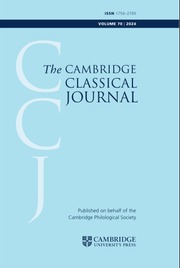Article contents
The drunk, the reformer and the teacher: agonistic poetics and the construction of persona in the comic poets of the fifth century*
Published online by Cambridge University Press: 28 February 2013
Extract
Although the role of competition in Greek cultural and social practices has been well documented and studied, it is only in the last decades that the extent to which it permeates Athenian drama has been realised. The element of competition in Athenian dramatic performances is now widely used as an interpretative tool, especially in Old comedy, where the competitive conditions of performance are overtly articulated. As research on the fragmentary comic poets proliferates, Aristophanes' rivals have become a far more visible element in the scenery of Old Attic comedy and, as a result, the fiercely competitive dimension of comic performances is more easily traced. We are now able to ask questions from new perspectives, and understand better such issues as authorial collaboration, charges of plagiarism, claims of degeneration and decline in the quality of plays and their authors, as well as illustrate the enormous role of audience reception in the interpretation of Old comedy. Aristophanes' bombastic and self-righteous comments regarding himself and his poetry are now read in a more nuanced manner, as a competitive poetic strategy which constructs a fictionalised ‘Aristophanes’.
- Type
- Research Article
- Information
- Copyright
- Copyright © The Author(s). Published online by Cambridge University Press 2008
References
BIBLIOGRAPHY
- 4
- Cited by




